- A POSTERIORI KNOWLEDGE
-
- Knowledge which comes after experience or is dependent upon experience.
- Also called empirical knowledge.
- Opposite to a priori knowledge.
- A PRIORI KNOWLEDGE
-
- Knowledge which comes before the experience or not dependent upon experience.
- You are born with the knowledge of the existence of God.
- "Black cats are black" is true by definition.
- Opposite to a posteriori knowledge.
- A PRIORI THEORY OF THE INTRINSIC
-
- Certain principles or ideas are self-evident and known intuitively because of their distinctness and clarity.
- E.g., "I think, therefore I am" (Descartes).
- A PRIORI PRESUPPOSITIONAL THEORY OF THE
-
- Before you can intelligently experience something, you need some a priori information, particularly some categories.
- Kant said that we are born with the knowledge of space and time.
- A PRIORI ANALYTICAL THEORY OF THE
-
- Before reasoning about something, you have to arbitrarily agree that there are some a priori rules or postulates.
- Abbott, Lyman
- (1835-1922)Lyman Abbott
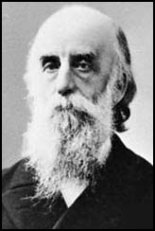
Lyman Abbott
- Born in Roxbury, Mass.
- son of Jacob Abbott.
- American Congregationalist.
- He was ordained a minister in 1860.
- Was an editor and reformer
- Succeeded Henry Ward Beecher at Plymouth Congregational Church in Brooklyn, NY in 1888.
- With Beecher he had begun in 1876 to edit the Christian Union the name of which he changed in 1893 to the Outlook.
- He championed a modern rational outlook in American Christianity.
- His published works:
- The Christian Ministry
- Jesus of Nazareth (1869)
- Old Testament Shadows of New Testament Truths (1870)
- A Dictionary of Bible Knowledge (1872)
- A Layman's Story (1872)
- Illustrated Commentary on the New Testament (4 vols., 1875)
- For Family Worship a book of devotions (1883)
- A Study in Human Nature (1885)
- In Aid of Faith (1886)
- Life of Christ (1894)
- Evolution of Christianity (Lowel Lectures, 1896)
- Christianity and Social Problems (1897)
- The Theology of an Evolutionist (1897)
- Life and Letters of Paul (1898)
- The Rights of Man (1901)
- Henry Ward Beecher (1883, 1903)
- The Spirit of Democracy (1910)
- America in the Making (1911)
- Reminiscences (rev. ed. 1923)
- See entry in 1911 Encyclopedia
- Abelard, Peter
- (1079-1142)Peter Abelard
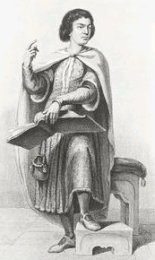
Abelard
- French scholastic philosopher and theologian
- known for his moral-influence theory of the atonement which states that Christ's death demonstrates divine love which moves man to turn to God
- persecuted by Bernard of Clairvaux for alleged heresy
- remembered for his romantic love affair with Heloise recorded in their love letters.
- Wrote
- Sic Et Non
- Christian Theology
- Story of Misfortunes
- Said "Nothing is to be believed until it is understood."
- See entry in 1911 Encyclopedia
- ABSOLUTE
-
- In metaphysics, the highest or most all-encompassing reality i.e., the Unconditioned, God, Unmoved Mover, World ground, Being, the Good, Logos, One, Substance, in Chinese thought Tao (Way), in Indian thought Brahman.
- ABSOLUTE IDEALISM
-
- says "Religion is devotion to a moral code reinforced by beliefs about the nature of things" (Royce).
- ABSOLUTE THEISM
-
- The theological position that there are absolutes such as "black and white" morals, the existence of God, truth.
- ACT AGAPISM
-
- See Situation ethics
- ACT DEONTOLOGY
-
- Moral action which is governed by one's sense of duty (Greek: deon δεον) in contrast to an action which is done because of the outcome.
- Act deontology: I tell the truth because it is the right thing to do
- Act teleology: Although I know that telling the truth is the right thing to do, I am going to tell a lie because in the end the truth may be too painful for someone.
- ACT TELEOLOGY
-
- Moral action which is governed by the end result (Greek: telos τελος) in contrast to an action which is done because is is the right thing to do.
- ACT UTILITARIANISM
-
- Moral action which is right if and only if that act maximizes the good, that is, if and only if the total amount of good for all minus the total amount of bad for all is greater than this net amount for any incompatible act available to the agent on that occasion.
- ACTION THEORY
-
- There is a logical difference in principle between what you do intentionally (an action) and what chances to happen.
- Cause and effect explanations apply to what happens, not to actions.
- You cannot define actions in terms of happenings or their relations. Logically (but not in fact) determinism does not apply to actions.
- When you choose, decide, or act, you do it because of reasons not causes.
- We violate moral language when we use deterministic causes to explain our choices.
- While the Libertarian argues from observation that there are uncaused acts, action theory argues a priori that acts are in principle uncaused.
- Adams, Jay E.
- (1929-)Jay E. Adams, Jay Adams
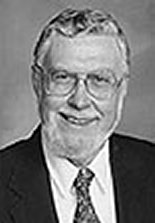
Jay Adams
- Reformed background who received his doctorate in preaching but is most known for his book Competent to Counsel in which he states that any Christian is more competent to counsel than any secular psychologist.
- Although he denies it, his behaviorist training is clearly seen in his counseling.
- Recently wrote Sermon Analysis - A Preacher's Personal Improvement Textbook and Workbook.
- Adams, Thomas
- (1580-1653)Thomas Adams
- Although not a Puritan, he was called by the English Puritans as "The Shakespeare of the Puritans"
- rector of St. Bennet's at London
- See entry in 1911 Encyclopedia
- ADOPTIONISM
-
- Jesus became God
- Until he was 30, Jesus was only a man
- At his baptism (or his resurrection) God adopted Him as His Son
- Aenesidemus
- (c AD 50)
- He was the founder of Pyrrhonian Skepticism
- He was born at Gnossus in Crete, but lived at Alexandria
- Originally a member of Plato's Academy
- Developed ten modes of skepticism:
- The feelings and perceptions of all living beings differ.
- People have physical and mental differences, which make things appear different to them.
- The different senses give different impressions of things.
- Our perceptions depend on our physical and intellectual conditions at the time of perception.
- Things appear different in different positions, and at different distances.
- Perception is never direct, but always through a medium. For example, we see things through the air, fish see through water.
- Things appear different according to variations in their quantity, color, motion, and temperature.
- A thing impresses us differently when it is familiar and when it is unfamiliar.
- All supposed knowledge is predication. All predicates give us only the relation of things to other things or to ourselves; they never tell us what the thing in itself is.
- The opinions and customs of people are different in different countries.
- See entry in 1911 Encyclopedia
- AESTHETIC HUMANISM
-
- says religion is an expression of aesthetic value as are poetry and myth.
- God is the highest symbol of man's highest ideals (Santayana).
- Also see Religious Humanism.
- AESTHETIC STAGE
-
- One of Kierkegaard's stages or ways of life.
- The aesthete lives for immediate satisfaction or pleasure.
- AESTHETICS
-
- philosophy of art (Hegel)
- AGAPISTIC ETHICS
-
- Stresses both love of God (one ought to obey His commandments) and love of neighbor (result of obedience to His command).
- We love God and man because He commands us or because God loves us and we ought to imitate Him.
- Evangelical agapistic ethics stresses the indwelling Christ through whom our acts reflect a supernatural love that is also always in obedience to biblical imperatives.
- Non-traditional agapistic ethics stresses that our love of God is expressed by loving our fellow man.
- Act agapism: do the most loving thing in each situation.
- Let love determine your obligation rather than rules.
- Rule agapism: follow rules that produce the most love.
- Albertus Magnus
- (1193-1280)
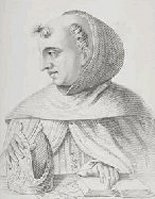
Albertus Magnus
- "Albert the Great"
- German Dominican preacher and teacher
- tried to integrate the thought of Aristotle with Christianity; had a major influence on Thomas Aquinas
- Said "Theology is science in the truest sense."
- See entries in
- ALBIGENSIANS
-
- See Cathari.
- Albright, Jacob
- (1759-1808)Jacob Albright
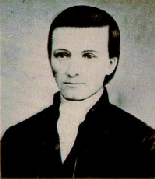
Jacob Albright
- Raised as a Lutheran, but became a Methodist
- Unintentionally helped to found the Evangelical Church in Pennsylvania in 1803, which merged with the United Brethren in 1946.
- See entry in 1911 Encyclopedia
- Alexander, Ales (Alesius)
- (1500-1565) Alesius Alexander Ales Alexander
- Scottish Protestant Reformer; first to lecture on Hebrew Scriptures at Cambridge.
- As canon of the collegiate church at St. Andrews he tried to reclaim Patrick Hamilton from his Lutheran views but was himself persuaded to accept the reformed teachings.
- In 1532 he escaped to the Continent, where he gained the confidence of Martin Luther and Philip Melanchthon and joined in signing the Augsburg Confession.
- He was commended to Henry VIII by them, and arriving in England in 1535, he enjoyed friendly association with Archbishop Cranmer, Thomas Cromwell, and others.
- He lectured on divinity at Cambridge and afterward practiced medicine in London.
- After Cromwell's fall in 1540, Alesius returned to Germany, where he was professor of theology, first at Frankfurt-an-der-Oder and later at Leipzig.
- See entry in 1911 Encyclopedia
- Alexander, Archibald
- (1772-1851) Archibald Alexander
- US Presbyterian first President of Princeton
- Wrote Thoughts on Religious Experience
- See entry in 1911 Encyclopedia
- Alexander, James W.
- (1804-1859) James W. Alexander, James Alexander
- US Presbyterian
- Eldest son of Archibald
- Preacher
- Wrote:
- The Life of Archibald Alexander
- Thoughts on Family Worship
- Thoughts on Preaching
- Consolation: Discourse Address to the Suffering People of God
- Translated the hymn "O Sacred Head, Now Wounded" into English.
- See entry in 1911 Encyclopedia
- Alexander, Samuel
- (1859-1938) Samuel Alexander
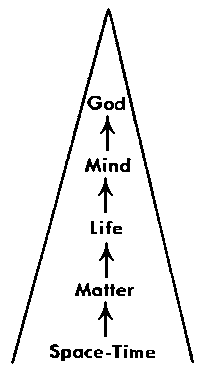
His thought
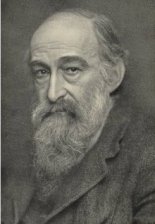
Samuel Alexander
- philosopher and professor at Manchester
- Realist metaphysics
- Wrote: Space, Time, and Deity
- Holds a theory of the mind called emergentism
- The mind evolves from matter and life
- Evolution produces genuine novelties not reducible to the elements of lower levels
- Each emergent has
- a structure differing from the structure of its constituents and
- a function peculiar to its level
- the tendency toward emergence is identified as a nisus (striving) (see Bergson's élan vital)
- there is a continuous interaction and interdependence of all the levels, as, e.g., of brain (life) and mind (interactionism).
- Alleine, Joseph
- (1634-1668) Joseph Alleine
- Presbyterian Puritan
- wrote
- An Alarm to the Unconverted: A Sure Guide to Heaven
- imprisoned for singing psalms and preaching to his family in his own home
- See entry in 1911 Encyclopedia
- Allis, Oswald T.
- (1880-1973) Oswald T. Allis
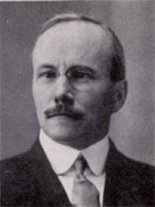
Oswald T. Allis
- Professor at Princeton who left with others to form Westminster
- Wrote
- The Five Books of Moses (1943)
- Prophecy and the Church (1945)
- The Unity of Isaiah (1950)
- The Old Testament: Its Claims and Its Critics (1972)
- See entry in Westminster Theological Seminary
- Allon, Henry
- (1818-1892) Henry Allon
- English Congregationalist
- pastored 48 years in London church (Union Chapel 1844-92)
- emphasized congregational singing
- Published Congregational Psalmist
- edited British Quarterly Review (1877-86)
- See entry in 1911 Encyclopedia
- Altizer, Thomas J. J.
- (1927-____) Thomas Altizer
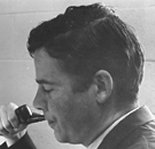
Thomas Altizer
- Received his degrees of A.B., A.M., and Ph.D. at the University of Chicago.
- He was Associate Professor of Bible and Religion at Emory University, Atlanta Georgia
- With William Hamilton, he wrote Radical Theology and the Death of God thus beginning the Death of God theory.
- See entry in Dictionary of Modern Western Theology
- ALTRUISM
-
- The teaching that it is your duty to ignore your own happiness in favor of the happiness of others.
- ALTRUISTIC HEDONISM
-
- We ought to sacrifice personal happiness in order to bring any increase of happiness to others.
- Ambrose
- (c 340-397)

Ambrose
- Imperial governor of Upper Italy who became Bishop of Milan in 374.
- His actions reveal the new power of the Christian Church after Constantine, but also its intolerance of heretics and pagans
- exerted strong influence over the young Emperor Gratian and the Emperor Theodosius.
- Augustine was converted (& baptized) under his influence.
- Ambrose also influenced church music.
- See entries in
- Catholic Encyclopedia
- See entry in 1911 Encyclopedia
- Ambrose, Isaac
- (1604-1663) Issac Ambrose
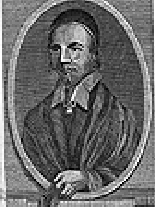
Isaac Ambrose
- English Presbyterian preacher
- wrote Looking Unto Jesus
- See entry in 1911 Encyclopedia
- AMISH
-
- An Anabaptist sect which split away from the other Mennonites at the end of the 17th century.
- The founder of the sect was a Mennonite minister in Switzerland named Jacob Ammann.
- He strongly felt that certain transgressions, such as lying, justified excommunication from the church and that excommunication should involve social ostracism.
- He visited different Mennonite congregations throughout Switzerland and aggressively demanded that the leaders of each congregation state their views on these issues.
- In the end, his actions forced a schism among the Mennonites in Switzerland, Alsace, and southern Germany.
- Those Mennonites who adhered to Jacob Ammann's views came to be known as Amish Mennonites or simply as the Amish.
- Jacob Ammann eventually settled in Alsace, now part of France, where he found a considerable following.
- By 1727 members of the sect had begun to immigrate to America, as had other German Mennonites.
- The Amish are no longer a distinct religious denomination in Europe, where they were eventually reabsorbed into the larger community of Mennonites.
- From the beginning, Jacob Ammann insisted that the members of his church conform to a particular style of dress and that men leave their beards untrimmed.
- Even before coming to America the Amish had adopted the custom of using hooks and eyes rather than buttons to fasten clothing.
- The Amish church is decentralized.
- The basic unit of Amish society is the district, or congregation, consisting of several dozen families.
- Religious services are held in rotation at the homes of different church members.
- Ministers and deacons are elected by the members of the local congregation and bishops are elected by the ministers of a local area.
- The decentralization of the church has resulted in a general lack of uniformity with regard to church doctrine.
- The majority of the Amish, known as the Old Order Amish, refuse to drive automobiles or have electricity in their homes.
- A smaller group, the Beachy Amish, are less strict about such matters.
- They wear Amish dress but meet in churches rather than homes
- Ammann, Jacob
- Jacob Ammann
- Founder of the Amish
- ANABAPTIST
-
- Key leaders were
- Conrad Grebel
- Felix Manz
- Georg Blaurock
- Ludwig Hätzer
- Balthasar Hübmaier
- Distinctive characteristics:
- repudiated church-state ties and infant baptism
- Church was a voluntary association of committed believers
- practiced strict church discipline
- pacifists
- some practiced community of goods
- had religious toleration for all
- maintained simplicity of dress and lifestyle
- some had mystical tendencies
- These distinctives were also held by the Hutterites, Schwenkfelders, Mennonites, and Amish.
- Key leaders were
- ANALYTIC PHILOSOPHY
-
- favored more by English speaking philosophers.
- Contrasts with Existential Philosophy favored by European philosophers.
- Concerned with clarifying all uses of reason and language regarding what we claim to know or what value judgment we make.
- Anaxagoras
- (c 500-428 BC)
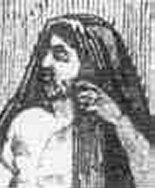
Anaxagoras
- All objects in nature are composed of tiny "seeds" or particles which contain the qualities we perceive in things.
- A kind of cosmic mind causes these "seeds" to combine to form each object, and later to separate when the object changes or is destroyed.
- He taught Euripides and Pericles.
- See entries in
- Internet Encyclopedia
- See entry in 1911 Encyclopedia
- Anaximander
- (c 611-c 547 BC)
- The author of the first surviving lines of western philosophy.
- He speculated and argued about "the Boundless" as the origin of all that is.
- He also worked on the fields of what we now call geography and biology.
- Moreover, Anaximander was the first speculative astronomer.
- He originated the world-picture of the open universe, which replaced the closed universe of the celestial vault.
- He also believed that man evolved from a fish.
- See entries in
- Anaximenes
- (c 550 BC)
- He was said to be the student of Anaximander
- like him, he sought to give a quasi-scientific explanation of the world.
- See entries in
- Andrewes, Lancelot
- (1555-1626)Lancelot Andrewes
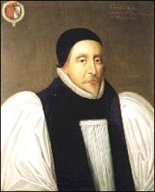
Lancelot Andrewes
- Bishop of Winchester
- was on the committee of scholars that produced the King James translation of the Bible, and probably contributed more to that work than any other single person
- It is accordingly no surprise to find him not only a devout writer but a learned and eloquent one, a master of English prose, and learned in Latin, Greek, Hebrew and eighteen other languages.
- His sermons were popular in his own day, but are perhaps too academic for most modern readers.
- He prepared for his own use a manuscript notebook of Private Prayers, which was published after his death.
- The material was apparently intended, not to be read aloud, but to serve as a guide and stimulus to devout meditation.
- He used puns in his sermons.
- See entry in 1911 Encyclopedia
- Angier, John
- (1605-1677)John Angier
- Puritan preacher in one church for 45 years
- kept "private days" for his personal spiritual renewing
- Anhypostatic Christology
-
- The divine being (God) took on impersonal humanity rather than an individual human personality
- ANIMAL FAITH
-
- an expression used by Santayana"> in his book Skepticism and Animal Faith to describe the response that we have toward the material things around us.
- Anselm
- (1033-1109)

Anselm
- known for
- his view of faith and reason: "Faith precedes knowledge"
- his ontological argument
- his interpretation of the atonement
- wrote
- Monologium
- Proslogium
- Cur Deus Homo
- See entries in
- known for
- Anthony of Padua
- (1195-1231)
- Portuguese
- at age 15 became an Augustinian monk
- then at age 25 became a Franciscan
- allegorical open-air preacher
- emphasized repentance.
- See entry in 1911 Encyclopedia
- ANTHROPOLOGY
-
- Study of man, his origin, his character, his constitution
- See Cultural anthropology
- ANTHROPOMORPHISM
-
- God is described in terms of a man
- God is like man in at least some respects
- "God's arm is not short that it cannot save."
- ANTIFALLIBILISM
-
- states that some empirical judgments are certain provided they have adequate confirmation.
- e.g., "We can be sure that there are five people in this room."
- See Fallibilism
- ANTIMETAPHYSICAL
-
- Pertaining to opposition to raising metaphysical questions or attempting to give metaphysical explanations.
- ANTINOMY
-
- A contradiction or tension between two or more laws, rules, or principles, each of which is held to be true.
- See Kant's antinomies
- Antisthenes
- (c 444-360 BC)
- Greek philosopher
- founded discipline of Cynicism
- followers are Cynics
- happiness comes through virtue
- emphasized hard work
- denounced art, literature, and luxury
- his famous pupil was Diogenes
- See entry in 1911 Encyclopedia
- ANTITHESIS
-
- Opposition or contrast
- according to Hegel, an event, idea, or movement which arises in contradiction to a preceding thesis.
- APPOLINARIANISM
-
- Jesus took only some of the nature of humanity
- Since man had three parts (body, soul, spirit), Christ's human nature was made up of only body and soul.
- The divine Logos took the place of the spirit.
- Apollinarius the Younger
- (c 310-c 392)
- Bishop of Laodicea
- taught that the divine Logos took the place of the human soul in Jesus
- thus His humanity was confined to His body
- view condemned in 381 at the Council of Constantinople.
- See entry in 1911 Encyclopedia
- Aquinas, St. Thomas
- (c 1225-1274)St. Thomas Aquinas
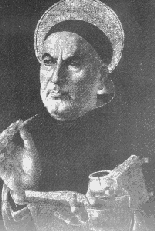
St. Thomas Aquinas
- Italian Dominican monk and theologian
- wrote
- Summa Contra Gentiles
- Contra Errores Graecorum
- Summa Theologiae
- Summa Theologiae united Aristotle's philosophy with Christianity to become the classic Roman Catholic theology
- used allegory in his sermons
- He is noted for rational proofs for existence of God
- His view is called Thomism
- 20th century theologians of his kind are Neo-Thomists
- Regarding his view of the theory of knowledge, he was not like Plato who held that man knows everything innately
- instead he followed Aristotle
- Reason is insufficient to know God or the world
- Natural reason leads one to the "porch of faith."
- There has to be a "given" to supplement reason
- Knowledge of God needs revelation while knowledge of the world needs experience
- However, God's revelation and man's experience overlap
- Therefore, in this overlapping area, man is able to know something of God through his experience
- In particular, he knows the existence of God.
- See entry in 1911 Encyclopedia
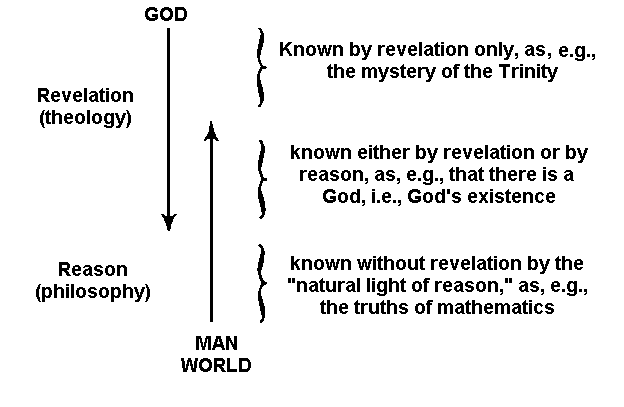
Aquinas's view of reality
- Arcesilaus
- (316-241 BC)
- Athenian philosopher
- reacted against Stoic dogmatism
- taught a "skeptical suspension of judgment."
- See entry in 1911 Encyclopedia
- ARIANISM
-
- Only the Father is uncreated
- "The Word" is the Father's first creation
- Christ was a created being neither God nor man; He was a demi-god (something in-between)
- Holds that Christ was half God and half man
- A view developed by Arius
- View was condemned at Council of Nicea in 325
- ARIANS
-
- A view developed by Arius
- Holds that Christ was half God and half man
- View was condemned at Council of Nicea in 325
- ARISTOTELIANISM
-
- See Neo-Thomism
- Aristotle
- (384-322 BC)

Aristotle
- Greek philosopher who developed an empirical philosophy contrary to Plato's ideas
- he wrote
- on logic: Organoninstrument
- on physics: Physics
- on metaphysics: Metaphysica
- on psychology: De Anima
- on ethics: Nichomachaean Ethics
- on politics: Politics
- on rhetoric: Rhetoric
- on aesthetics: Poetics
- His theory of knowledge: rationalism
- unlike Plato, he viewed the object of knowledge not the world of ideas
- combines the scientific rationalism of Democritus with the axiological rationalism of Plato's materialism with idealism
- ideas or forms are in things only
- logic becomes the means of relating the general (i.e., ideas) or being to particulars (i.e., phenomena) given in perceptions
- the mechanism of deduction is the syllogism, where two propositions presumed to be true are given and a third is inferred
- deductions can demonstrate general principles in particulars but do not establish the general principles themselves or new knowledge
- he abstracted general principles from particulars by induction or investigation
- he links the concepts of investigation to reality as the causes of the particulars
- he sought the general or metaphysical causes of things
- contemporary non-Aristotelian induction arrives at probable (rather than intuitively certain) general principles
- certainty rather than probability characterizes Aristotelian science and theory of knowledge.
- His theory of knowledge:
- teleology, Aristotelianism, vitalism
- reality is that which unfolds in phenomena
- it involves matter and form
- matter is that in which things consist
- form is that which organizes or directs matter
- form and matter are inseparable
- where there is form, there is matter except that First Cause the Unmoved Mover is transcendent pure form
- together matter and form comprise substance e.g.,
- man's essence is form
- his physical and psychological makeup is matter
- Substance (e.g., man) possesses attributes or universals (e.g., redness)
- universals (redness, etc.) are in particular things only as opposed to Plato
- there are 10 categories of reality, of which substance is primary because it is "that which is neither predicable of a subject nor present in a subject"
- only substance is subject
- all other categories (redness) or quantity (e.g., 5 meters long) must be predicated of a substance
- Categories refer not only to thought and language but to reality as well
- matter and form are relative (e.g., lumber is the form of wood but the matter of a house)
- matter possesses the potentiality of becoming form
- form is actuality (e.g., an acorn is the actuality of itself but the potentiality of an oak tree)
- Actualization or becoming results from cause
- causes or factors of change are
- material
 the limitations of
matter
the limitations of
matter - formal
 the pattern of form acquired
the pattern of form acquired - efficient
 the force producing
change
the force producing
change - final
 the end (entelechy) or purpose
of actualization
the end (entelechy) or purpose
of actualization
- material
- The Final Cause of all reality is an unchanging, unmoved mover or pure form
- Reality is an eternal but teleological process by which potentiality acquires actuality in the interest of actualizing pure form (reason)
- His theory of mind (soul) and ethics:
- functionalism, eudaemonism
- Mind (soul) is the "primary actuality of a natural body endowed with life" and related to it as vision is to the eye. The entelechy of the body is the body's inherent nature.
- Mind is that for which the body as rational being exists
- Mind is that which animates the body toward self-realization.
- The highest good (summum bonum) is activity directed to self-realization in terms of the exercise of active or pure reason.
- Achievement of self-realization produces eudaemonia (well-being).
- See entry in 1911 Encyclopedia
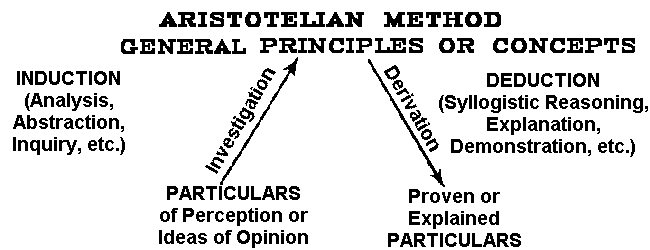
Aristotle's method
- Arius
- (c 270-d 336)

Arius
- A parish priest in Alexandria
- condemned at Council of Nicea in 325 for his views of the person of Christ
- held that Christ was half God and half man
- his view is now called Arianism
- argued with Athanasius
- Arius was banished by Roman Emperor Constantine (325)
- But in the reaction after Nicaea, he came into imperial favor
- The emperor had ordered the Athanasians at Alexandria to receive him at communion when he suddenly died.
- See entries in
- ARMINIAN
-
- A person who holds to the views of James Arminius in full or in modified form.
- ARMINIANISM
-
- The views of James Arminius which states that a person can accept salvation without first being regenerated.
- God's grace lifts him to the position of making a choice to accept the offer to follow God or refuse it. If he accepts, he is regenerated.
- From Adam, all men have a corrupt nature which inclines them to sin
- Men are responsible only for their own sins (not Adam's)
- In the areas of morals, men are given freewill to choose negative, neutral, or positive direction
- This free-will has been weakened by the fall of Adam, so that men are unable to choose God for salvation
- Man needs the helping grace of God to raise him to the level of choosing God for salvation or refusing it
- The opportunity to choose is given to all men who have received "helping grace"
- A man may be given helping grace many times in his life before he chooses to follow God
- From the level of following God, a man may lose his salvation and drop to the starting line in need of helping grace to choose God again
- Unlike Pelagianism which states that there is no need for God's grace, man can choose God without this grace.
- Unlike Calvinism which states that God's grace regenerates the man so that he will make the choice to follow God.
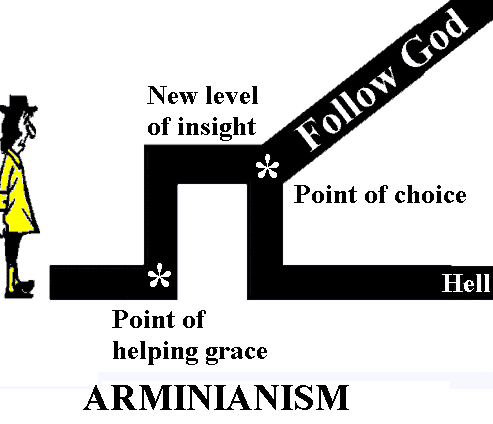
- Arminius, James
- (1560-1609) (AKA: Jacob Harmensen or Hermansz) James Arminius
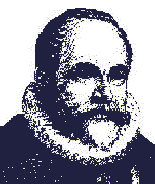
James Arminius
- Dutch theologian developed Arminianism.
- See entry in 1911 Encyclopedia
- Arndt, Johann Wilhelm
- (1555-1621) Johann Wilhelm Arndt
- German Lutheran Pietist
- mystic
- wrote True Christianity
- See entry in 1911 Encyclopedia
- Arnobius (the Elder)
- (c 248-327)
- North African apologist
- Converted from paganism
- Wrote Adversus Nationes attacking various forms of paganism in often brilliant invectives.
- See entry in 1911 Encyclopedia
- Arnold, Thomas
- (1795-1842) Thomas Arnold
- Anglican
- great rugby player
- believed in strong state church
- Father of Matthew Arnold
- headmaster of rugby (1828-42)
- introduced mathematics, modern history, and modern languages to curriculum
- introduced prefect system
- strongly influenced development of modern public schools in England
- Regius professor of history at Oxford (1841)
- See entry in 1911 Encyclopedia
- Arrhenius, Svante August
- (1859-1927) Svante August Arrhenius
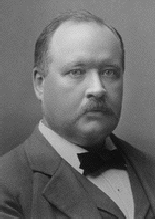
Svante August Arrhenius
- Swedish chemist and physicist
- Wrote
- Worlds in the Making
- Theories of Solutions
- Quantitative Laws in Biological Chemistry
- Developed theory of ionization for which he won the 1903 Nobel prize for chemistry.
- See entry in 1911 Encyclopedia
- Asbury, Francis
- (1745-1816) Francis Asbury
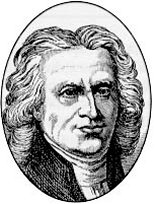
Francis Asbury
- Convert and disciple of John Wesley
- introduced Methodism in the US
- itinerate preacher on horseback from Maine to Georgia (almost 500,000 kms in total).
- See entry in 1911 Encyclopedia
- ASEITY
-
- Self-existence.
- When referring to God, it means that He is not dependent upon any reality other than Himself for His characteristics and that He is eternal.
- ASSOCIATIONISM
-
- The theory that your mind and its contents may be reduced to simple, discrete experiences that combine to form all aspects of the life of your mind.
- ASSOCIATIONISTIC PSYCHOLOGY
-
- See Associationism
- Athanasius
- (293-373)
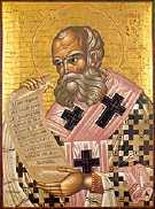
Athanasius
- Bishop of Alexandria, against Arianism; avoided allegory.
- Wrote On the Incarnation.
- See entries in
- ATHEISM
-
- The denial of the existence of God.
- God does not exist.
- The idea of God is self-contradictory.
- Augustine of Hippo
- (354-430)

Augustine
- the greatest theologian of the early church
- Wrote
- Confessions
- The City of God
- On the Trinity
- His theory of reality:
- absolute theism, supernaturalism
- Reality is God, who is Being
- Being is good
- non-Being is evil (see Plotinus)
- God has personality and impersonality, transcendence and immanence, omnipotence and perfect will
- As Being, God gives reality to phenomena
- As Supreme Person (theism), God exercises perfect will by which the world is created from nothing, sustained, perfected, and consummated
- All existence, including space and time, is absolutely dependent on God's will
- Reality is two-fold (dualism): God as Being, the Good, the Eternal; and His creation as phenomenal, dependent, temporal.
- See entry in 1911 Encyclopedia
- Aulen, Gustaf Emanuel Hildebrand
- (1879-1978) Gustaf Emanuel Hildebrand Aulen
- Swedish theologian of Lundensian theology which emphasized the primacy of love
- wrote
- The Faith of the Christian Church
- Christus Victor which restated the Devil Ransom theory of the atonement.
- Aurelius
-
- See Marcus Aurelius
- Austin, John
- (1790-1859) John Austin
- utilitarian philosopher of jurisprudence
- founded English analytical school of jurisprudence
- See entry in 1911 Encyclopedia
- Austin, John L.
- (1911-1960) John L. Austin
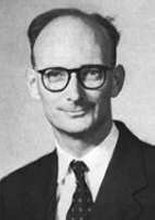
John L. Austin
- wrote
- Philosophical Papers
- How to Do Things with Words
- Wrote on the theory of language where he followed the Oxford School of analysis, linguistic analysis, and ordinary language philosophy.
- wrote
- AUTHENTIC EXISTENCE
-
- An Existentialist expression meaning a way of life which asserts one's own individuality and freedom.
- It is a secular equivalent of salvation.
- Averroes
- (1126-1198)
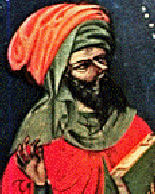
Averroes
- Islamic philosopher
- tried to recover the true essence of Aristotle's thought without theological considerations.
- See entry in 1911 Encyclopedia
- Avicenna
- (980-1036/7)

Avicenna
- Persian physician and philosopher whose translation of Aristotle was instrumental in keeping alive classical thought during the Middle Ages.
- See entry in 1911 Encyclopedia
- AXIOLOGICAL NOMINALISM
-
- Also called Skepticism and (emotivism).
- Value judgments are expressions of emotion or attempts to persuade.
- They are not factual. A science of values (axiology) is impossible.
- AXIOLOGICAL OBJECTIVISM
-
- Also called Axiological Realism.
- Values, norms, ideals, etc. are component parts of objects or they reside in objects or in objective reality; or they are ascribed to objects by desire.
- See Objectivism
- AXIOLOGICAL RELATIONISM
-
- Value is a relation between two or more variables or is a product of several variables in interaction.
- Values are not private (subjective) but public, though not objective in the sense of being independent of interests.


